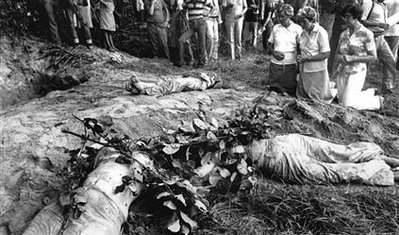Remaking Robert Gates
 The Bush administration’s push for a Gates confirmation in the lame-duck Congress this year betrays a hint of unease over what might happen to the nominee for Secretary of Defense if he were to face a Democratic-controlled Congress.
The Bush administration’s push for a Gates confirmation in the lame-duck Congress this year betrays a hint of unease over what might happen to the nominee for Secretary of Defense if he were to face a Democratic-controlled Congress.While all of Washington is busily recasting this hard man of the Casey era into a cuddly, "pragmatic," experienced, and realistic diplomat, the past could still trip him up. Gates escaped indictment in Iran-Contra amidst indications he was lying to cover up his own role in the affair. The independent counsel who investigated the scandal, Lawrence Walsh, says in his own memoir he did not believe Gates' professed innocence. There is the suggestion of perjury in his testimony, which was replete with numerous lapses of memory and profuse apologies for not having more carefully considered the policy implications of this secret, unconstitutional war.
And while he escaped prosecution, the affair temporarily slowed the rise of Casey's protégé, slowed it enough to force withdrawal of his nomination to be head of the CIA in 1987. By 1991 the details of the scandal were all but forgotten, and Gates easily gained approval as Bush Senior’s CIA director. However, during the confirmation hearings several CIA employees with lengthy tenures at the agency came forward to testify against Gates, describing at length how Casey’s director of intelligence manipulated research so as to jibe with Reagan policy goals. "Gates knows how to develop his credentials and ingratiate himself," one colleague said of the nominee. He "ignored or scorned" views that didn’t conform to his own preconceptions Melvin Goodman, a senior official with a lengthy tenure noted. Gates’ role was "to corrupt the process and the ethics of intelligence."
Jennifer Lynn Glaudemans, a CIA employee testified, "I think he misrepresented what was in the record of finished intelligence…. Not only could we feel Mr. Gates’s contempt, we could sense his party line….We were told, 'do not come to a conclusion, it may offend the 7th floor.'"
All this is doubtless buried in a history no one in Washington wants to dredge up. Anyway, Gates is enjoying a makeover, with such people as Admiral Bobby Ray Inman, who served as head of the NSA and was deputy director of the CIA, comparing Gates to Clark Clifford, the well-regarded Washington lawyer who served as an intimate advisor to several presidents. A story in the Washington Post this morning pushes along the remake: "Bob Gates comes from the realist school of how to operate internationally," Dennis Ross, a Mideast envoy for Bush Senior, told the Post. "As such…it is pretty clear the neoconservative agenda on regime change and democracy promotion will take a back seat to stability and less pressure on regimes to open up their political systems."
This is the new refurbished Gates. Gone is the old Gates—the man who manipulated intelligence, plotted the overthrow of the Marxist-Leninist foothold country of Nicaragua, drew up plans for invading Libya, and twisted intelligence to show the Soviets were masterminds of international terrorism.
But one never knows in Washington what might happen amidst the shift in political alignments. If the new Democratic-controlled Congress were in session, someone might come forward at the Gates confirmation hearing of the Senate Armed Services Committee. In the new Congress that committee will be chaired not by John Warner, who had participated in Gates earlier confirmation to the CIA, but the Democrat, Carl Levin of Michigan. Could Bush depend on the liberal Levin, who has been in Congress since 1978 and is a vocal critic of the Iraq war, to get down for Gates? Maybe not. So best to get this over with quickly in the lame-duck session where the old dependable John Warner will see it through.
Posted by James Ridgeway on 11/10/06 at 6:19 AM
LinkHere




0 Comments:
Post a Comment
<< Home